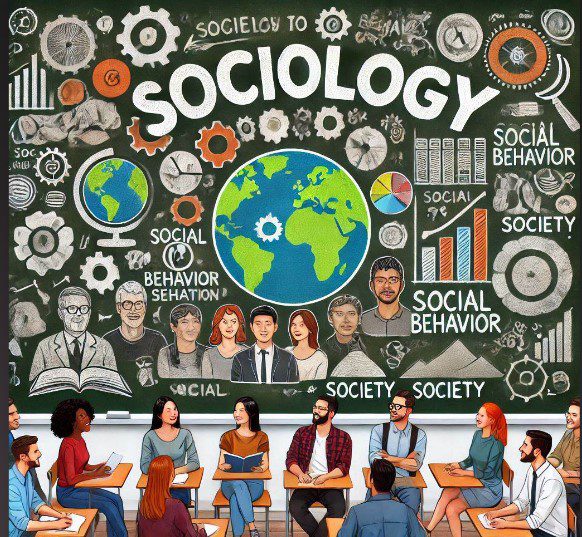Sociology, the scientific study of society, culture, and human behavior, opens doors to a wide range of careers. With its emphasis on critical thinking, research skills, and understanding societal dynamics, sociology graduates are well-suited for roles in public service, private sector, research, education, and non-governmental organizations. Below is a detailed exploration of careers in sociology, including potential roles, required skills, and real-world applications.
1. Careers in Academia and Research
Role Overview:
- Sociologists in academia and research study social patterns, behaviors, and institutions. Their work contributes to knowledge creation, policy-making, and solving societal problems.
Key Careers:
- University Professor: Teach sociology courses, mentor students, and conduct research.
- Social Researcher: Design and conduct studies on topics like inequality, education, or migration.
- Policy Analyst: Work for think tanks, analyzing the impact of policies on different social groups.
Examples:
- A professor specializing in urban sociology might study how urbanization affects housing inequality.
- Researchers working for organizations like Gallup or Pew Research Center analyze trends in public opinion.
Skills Required:
- Proficiency in research methods (quantitative and qualitative).
- Strong analytical and writing skills.
- Expertise in statistical tools like SPSS or R.
2. Careers in Social Work and Community Development
Role Overview:
- Sociologists in social work and community development focus on improving the quality of life for marginalized groups by addressing issues like poverty, education, and healthcare.
Key Careers:
- Social Worker: Help individuals and families navigate challenges such as domestic abuse or unemployment.
- Community Development Officer: Work with local communities to identify needs and implement programs for social betterment.
- Case Manager: Provide support and resources to clients in areas like housing, mental health, or addiction recovery.
Examples:
- In Pakistan, social workers employed by organizations like Edhi Foundation or Aurat Foundation address challenges such as gender-based violence and child welfare.
Skills Required:
- Empathy and interpersonal communication.
- Problem-solving and crisis management.
- Knowledge of social justice issues and cultural sensitivity.
3. Careers in Government and Public Administration
Role Overview:
- Sociologists in government roles contribute to policymaking, urban planning, and public welfare initiatives.
Key Careers:
- Urban Planner: Design cities and communities to meet societal needs, addressing housing, transport, and environmental challenges.
- Public Policy Specialist: Work in government departments to draft policies on education, healthcare, or labor.
- Demographer: Analyze population trends to inform government planning.
Examples:
- In Pakistan, demographers working with the Pakistan Bureau of Statistics analyze census data to plan for population growth.
- Urban planners in cities like Lahore address challenges like traffic congestion and housing shortages.
Skills Required:
- Understanding of societal trends and population data.
- Ability to navigate bureaucratic systems.
- Strong communication and advocacy skills.
4. Careers in Human Resources and Corporate Sector
Role Overview:
- Sociologists in the corporate world use their understanding of human behavior to improve workplace culture, resolve conflicts, and optimize employee performance.
Key Careers:
- Human Resources Specialist: Manage recruitment, training, and employee relations.
- Diversity and Inclusion Officer: Develop programs to create equitable workplaces.
- Market Research Analyst: Study consumer behavior to inform marketing strategies.
Examples:
- A sociologist in HR at a multinational company like Nestlé Pakistan might design training programs to foster teamwork and leadership.
- Market researchers analyze consumer trends to help companies like Unilever launch culturally relevant products.
Skills Required:
- Knowledge of organizational behavior and workplace dynamics.
- Data analysis and survey design.
- Conflict resolution and interpersonal skills.
5. Careers in Non-Governmental Organizations (NGOs)
Role Overview:
- Sociologists working with NGOs tackle issues such as poverty, health, education, and human rights at grassroots levels.
Key Careers:
- Program Coordinator: Oversee development projects, manage budgets, and ensure objectives are met.
- Advocacy Officer: Campaign for policy changes or raise awareness about social issues.
- Field Officer: Work directly with communities to implement development initiatives.
Examples:
- In Pakistan, NGOs like Aga Khan Foundation and The Citizens Foundation employ sociologists to address educational disparities and rural development.
- Advocacy officers working with Human Rights Watch promote gender equality and freedom of expression.
Skills Required:
- Project management and report writing.
- Cultural awareness and adaptability.
- Grassroots mobilization and communication.
6. Careers in Criminal Justice and Law Enforcement
Role Overview:
- Sociologists in this field analyze crime trends, work on rehabilitation programs, and address systemic issues in criminal justice systems.
Key Careers:
- Criminologist: Study crime patterns to prevent criminal activities.
- Corrections Officer: Develop rehabilitation programs for inmates.
- Forensic Sociologist: Analyze the social factors contributing to criminal behavior.
Examples:
- Criminologists in Pakistan working with law enforcement agencies might study how poverty and unemployment contribute to rising street crimes in Karachi.
- Sociologists in corrections develop reintegration programs to reduce recidivism.
Skills Required:
- Knowledge of criminology and deviance theories.
- Strong data analysis and investigative skills.
- Ability to handle sensitive and confidential information.
7. Careers in Media and Communications
Role Overview:
- Sociologists in media and communications analyze societal trends and use storytelling to address social issues.
Key Careers:
- Journalist: Report on societal challenges, such as inequality or migration.
- Media Analyst: Study the impact of media on public opinion and behavior.
- Content Creator: Develop educational or advocacy content for digital platforms.
Examples:
- Sociologists working with media houses like Dawn News in Pakistan may cover stories on gender-based violence or urbanization challenges.
- Social media managers create campaigns highlighting issues like climate change, leveraging sociological insights to connect with audiences.
Skills Required:
- Strong storytelling and analytical skills.
- Understanding of audience behavior and cultural trends.
- Proficiency in digital tools and platforms.
8. Careers in International Development
Role Overview:
- Sociologists in international development work on projects addressing global challenges like poverty, education, and health.
Key Careers:
- Development Consultant: Advise governments or organizations on effective development strategies.
- Humanitarian Aid Worker: Provide support during crises such as natural disasters or conflicts.
- Monitoring and Evaluation Specialist: Assess the impact of development programs.
Examples:
- Sociologists working with organizations like UNDP Pakistan design programs for poverty alleviation and gender equity.
- Humanitarian aid workers with UNICEF address child malnutrition and education in flood-affected areas of Pakistan.
Skills Required:
- Strong research and analytical skills.
- Cross-cultural communication.
- Project monitoring and evaluation expertise.
9. Emerging Careers: Digital Sociology and Environmental Sociology
Digital Sociology:
- Focuses on how technology and digital platforms shape society.
- Careers: Social media strategist, tech ethics researcher, or digital behavior analyst.
Environmental Sociology:
- Examines the relationship between humans and the environment.
- Careers: Sustainability officer, environmental policy analyst, or climate change advocate.
Examples:
- Sociologists studying digital behaviors might work with tech companies to address misinformation on social media.
- Environmental sociologists in Pakistan contribute to climate adaptation policies in flood-prone regions.
Conclusion
A sociology degree provides a versatile foundation for a wide range of careers. Whether working in research, policy, advocacy, or the corporate sector, sociologists bring critical thinking and a deep understanding of human behavior to their roles. In a rapidly changing world, the ability to analyze societal trends and address social challenges ensures that sociologists will continue to play a vital role in shaping the future.
Stay tuned with Societyopedia to explore more about our social world.


